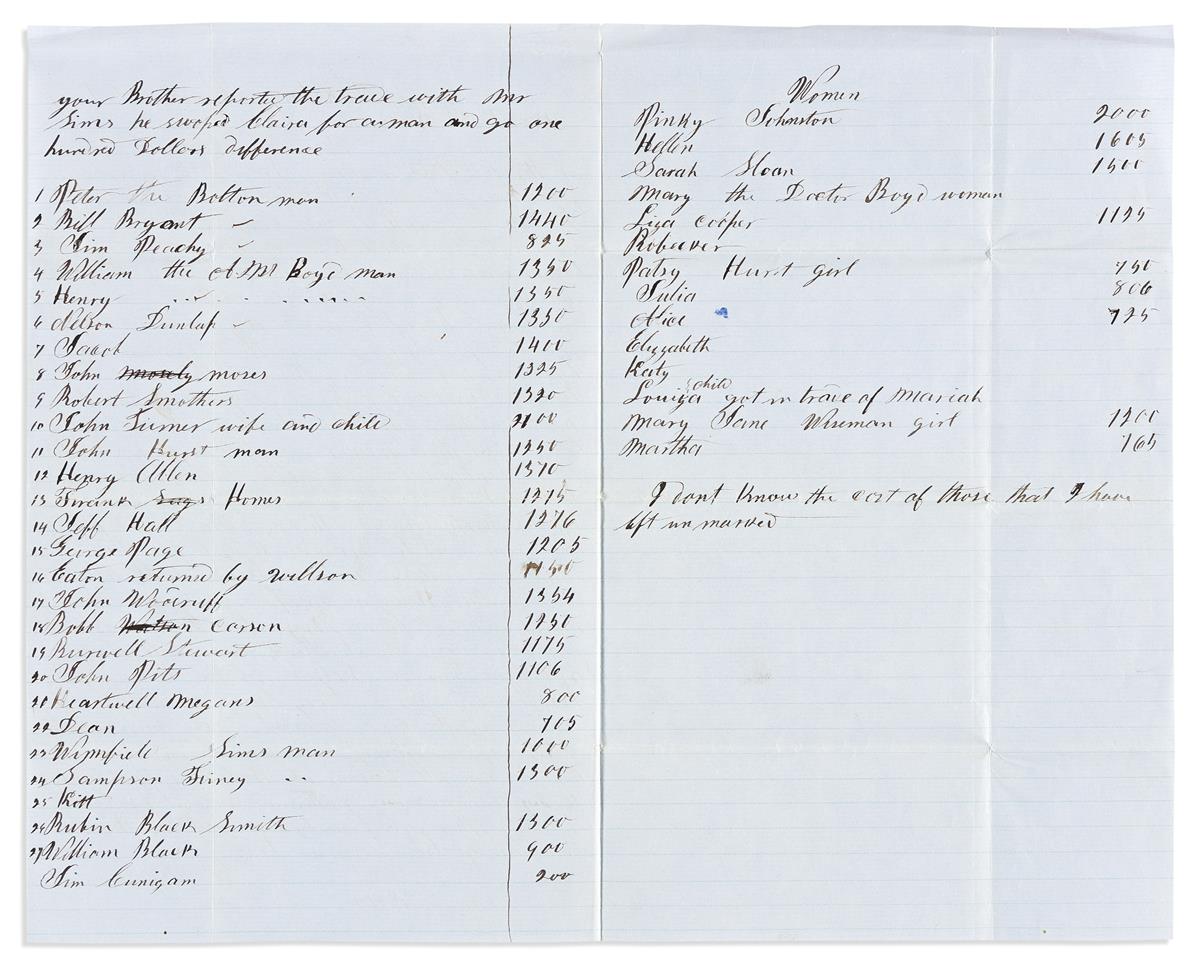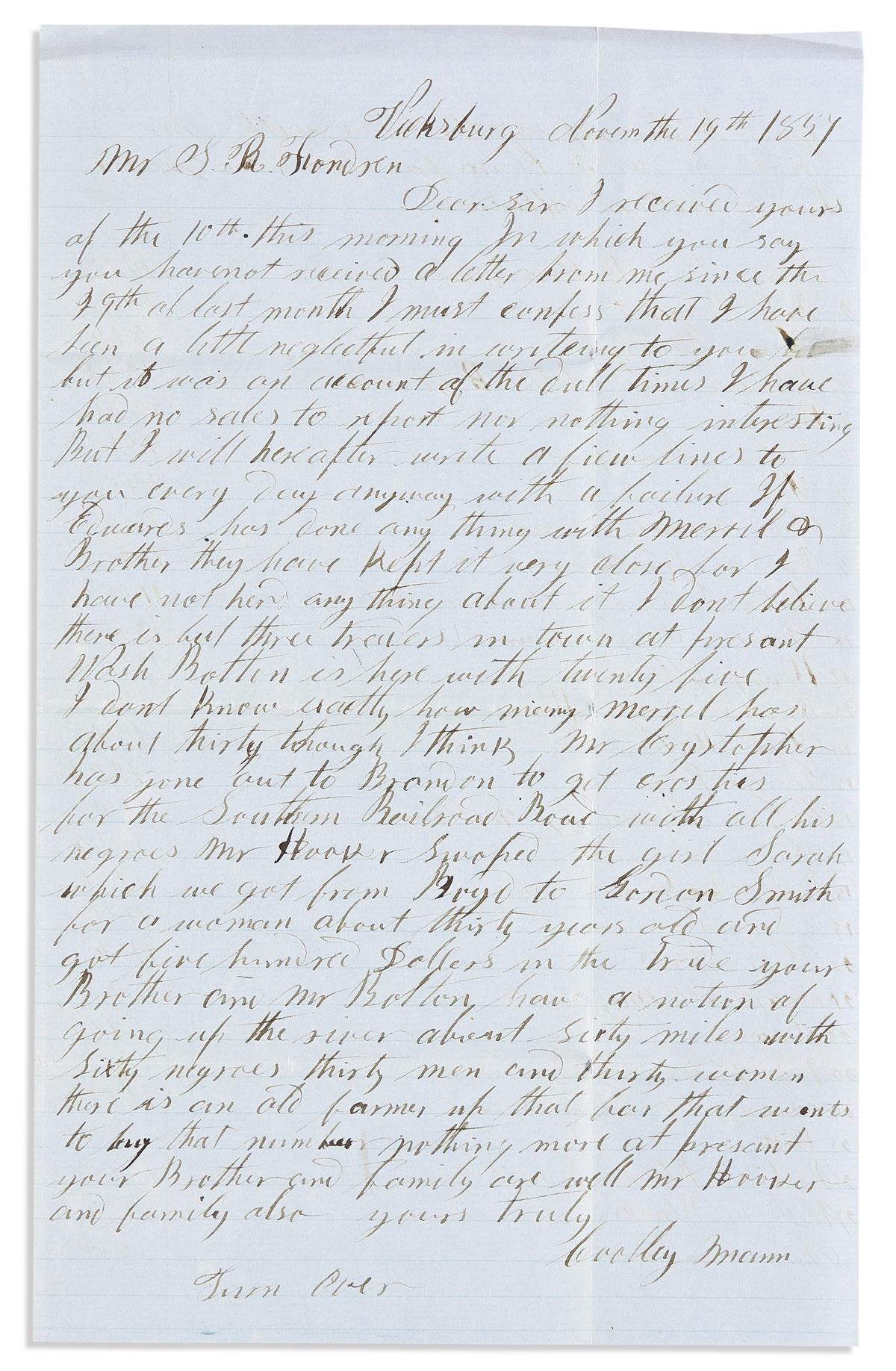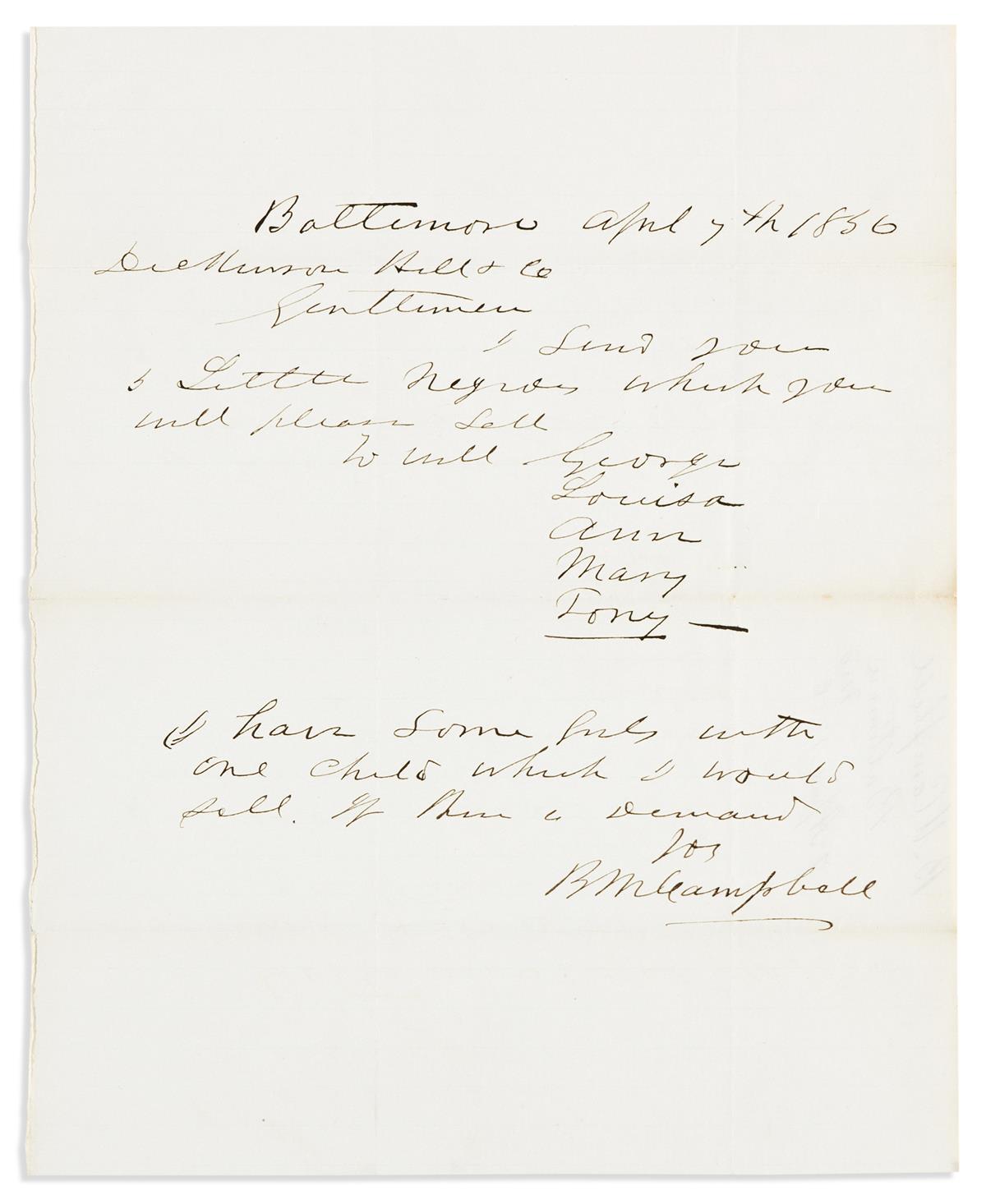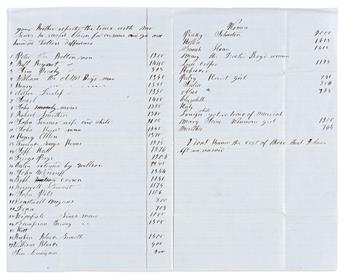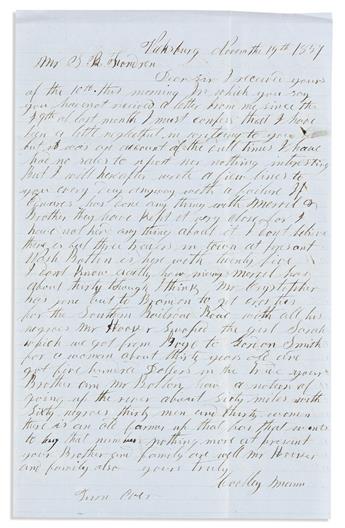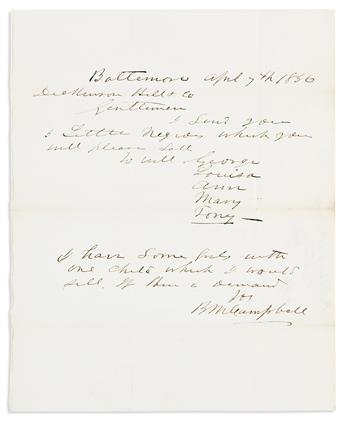Sale 2631 - Lot 16
Price Realized: $ 40,000
Price Realized: $ 50,000
?Final Price Realized includes Buyer’s Premium added to Hammer Price
Estimate: $ 30,000 - $ 40,000
(SLAVERY & ABOLITION.) Correspondence archive of the Richmond slave dealers Dickinson, Hill & Co., and S.R. Fondren. 41 items, including 38 letters and telegrams, plus 3 other documents; generally minor to moderate wear. Various places, 1845 and 1855-1862
Additional Details
This correspondence provides a wealth of information regarding the pricing and treatment of slaves as a commodity. The great majority of these 41 letters and documents refer explicitly to the sale of enslaved people.
Richard Henry Dickinson (circa 1811-1873) was a prominent slave trader in Richmond, VA. Most of these letters are addressed to the firm Dickinson, Hill & Co. which he formed in late 1854 and continued through emancipation in 1865. Many of the letters are offering human merchandise to the firm for sale, such as a letter from George Aler of Fredericksburg, VA on 21 June 1855: "The following are the description of Negroes I have. 1 woman 23 years old with four children pretty good. 1 woman & four children which you know. 1 girl 15 years, 1 girl 13 years, 1 man 26, 1 woman & 1 child young & likely." Sometimes regular customers would send unsolicited merchandise accompanied only by a note, such as B.M. Campbell of Baltimore on 7 April 1856: "I send you 5 little Negroes which you will please sell. To wit: George, Louisa, Ann, Mary, Tony. I have some girls with one child which I would sell if there is demand." On 27 November 1862, E. Britingham of North Carolina sent a very short note: "I send you by express my boy Glasco. Please sell him."
Some sellers seemed to express at least fleeting concern for the enslaved, if only to improve the sale price, such as John Nash of Portsmouth, VA on 9 April 1856: "Will you please let me know what the Dr. says in regard to the time it will take to make a cure of my girl Marina? If it will take months, it would probably be as well to send her down. I am determined to sell her as soon as she gets well. What can she be sold for as she is?" Similarly, James Y. Leigh of Norfolk, VA writes on 22 March 1858: "If you think the health of Louisa requires she should walk out at any time, say one hour or so each day, let her do so, & should she require shoes & clothes supply her." In another letter from Centerville, VA, of 19 April 1856, A. P. Grigsby makes a rare reference to his "fancy" slave ("fancies" were women kept for the pleasure of their owners): "My fancy has an increase, a boy, though she had a hard time of it. She had two physicians with her, but they are doing pretty well now."
Perhaps the most well-known correspondent in the archive is Joseph Bruin of Alexandria, VA, proprietor of the infamous Bruin's Slave Jail, acknowledging a check for "the proceeds of woman & child left with you by James Spink" on 22 June 1855.
7 of the letters, most dated November and December 1857, are addressed to Samuel Rainey Fondren (born circa 1824), an Alabama native who also ran slave auctions in Richmond; he may have been a partner in Dickinson, Hill & Co. The letters are from agents in Vicksburg, MS. These letters are generally longer and more descriptive than those addressed to Dickinson, Hill & Co., often boasting of advantageous "swaps." A letter from John M. Hooker to Fondren on 17 November 1857, tells him that another dealer had gotten the better of a trade: "John has just swaped Charisy to old Tim Sims for a man and fifty dollars, gutted him alive. Swaps are offering freely, no buyers." In a letter from Vicksburg on 19 November 1857, an agent named Coolley Mann writes to Fondren concerning local competition: "If Edwards has done anything with Merril & Brother, they have kept it very close, for I have not herd any thing about it. I don't believe there is but three traders in town at presant. Wash Bolton is here with twenty-five. I don't know exactly how many Merril has, about thirty though I think . . . Mr Hooper swoped the girl Sarah which we got from Boyd to Gordon Smith for a woman about thirty years old and got five hundred dollars in the trade. Your brother and Mr. Bolton have a notion of going up the river about sixty miles with sixty Negroes, thirty men and thirty women. There is an old farmer up that far that wants to buy that number." He finishes with a detailed two-page list of all the slaves he has in stock, comprising 29 men and 19 women, with entries such as "Eaton, returned by Willson," and "Louiza, child got in trade of Mariah," with the house's investment in most of them.
While single letters discussing slave sales are not uncommon, substantial archives of slave-trading correspondence are rarely if ever seen on the market. A detailed inventory is available upon request.
Richard Henry Dickinson (circa 1811-1873) was a prominent slave trader in Richmond, VA. Most of these letters are addressed to the firm Dickinson, Hill & Co. which he formed in late 1854 and continued through emancipation in 1865. Many of the letters are offering human merchandise to the firm for sale, such as a letter from George Aler of Fredericksburg, VA on 21 June 1855: "The following are the description of Negroes I have. 1 woman 23 years old with four children pretty good. 1 woman & four children which you know. 1 girl 15 years, 1 girl 13 years, 1 man 26, 1 woman & 1 child young & likely." Sometimes regular customers would send unsolicited merchandise accompanied only by a note, such as B.M. Campbell of Baltimore on 7 April 1856: "I send you 5 little Negroes which you will please sell. To wit: George, Louisa, Ann, Mary, Tony. I have some girls with one child which I would sell if there is demand." On 27 November 1862, E. Britingham of North Carolina sent a very short note: "I send you by express my boy Glasco. Please sell him."
Some sellers seemed to express at least fleeting concern for the enslaved, if only to improve the sale price, such as John Nash of Portsmouth, VA on 9 April 1856: "Will you please let me know what the Dr. says in regard to the time it will take to make a cure of my girl Marina? If it will take months, it would probably be as well to send her down. I am determined to sell her as soon as she gets well. What can she be sold for as she is?" Similarly, James Y. Leigh of Norfolk, VA writes on 22 March 1858: "If you think the health of Louisa requires she should walk out at any time, say one hour or so each day, let her do so, & should she require shoes & clothes supply her." In another letter from Centerville, VA, of 19 April 1856, A. P. Grigsby makes a rare reference to his "fancy" slave ("fancies" were women kept for the pleasure of their owners): "My fancy has an increase, a boy, though she had a hard time of it. She had two physicians with her, but they are doing pretty well now."
Perhaps the most well-known correspondent in the archive is Joseph Bruin of Alexandria, VA, proprietor of the infamous Bruin's Slave Jail, acknowledging a check for "the proceeds of woman & child left with you by James Spink" on 22 June 1855.
7 of the letters, most dated November and December 1857, are addressed to Samuel Rainey Fondren (born circa 1824), an Alabama native who also ran slave auctions in Richmond; he may have been a partner in Dickinson, Hill & Co. The letters are from agents in Vicksburg, MS. These letters are generally longer and more descriptive than those addressed to Dickinson, Hill & Co., often boasting of advantageous "swaps." A letter from John M. Hooker to Fondren on 17 November 1857, tells him that another dealer had gotten the better of a trade: "John has just swaped Charisy to old Tim Sims for a man and fifty dollars, gutted him alive. Swaps are offering freely, no buyers." In a letter from Vicksburg on 19 November 1857, an agent named Coolley Mann writes to Fondren concerning local competition: "If Edwards has done anything with Merril & Brother, they have kept it very close, for I have not herd any thing about it. I don't believe there is but three traders in town at presant. Wash Bolton is here with twenty-five. I don't know exactly how many Merril has, about thirty though I think . . . Mr Hooper swoped the girl Sarah which we got from Boyd to Gordon Smith for a woman about thirty years old and got five hundred dollars in the trade. Your brother and Mr. Bolton have a notion of going up the river about sixty miles with sixty Negroes, thirty men and thirty women. There is an old farmer up that far that wants to buy that number." He finishes with a detailed two-page list of all the slaves he has in stock, comprising 29 men and 19 women, with entries such as "Eaton, returned by Willson," and "Louiza, child got in trade of Mariah," with the house's investment in most of them.
While single letters discussing slave sales are not uncommon, substantial archives of slave-trading correspondence are rarely if ever seen on the market. A detailed inventory is available upon request.
Exhibition Hours
Exhibition Hours
Aliquam vulputate ornare congue. Vestibulum maximus, libero in placerat faucibus, risus nisl molestie massa, ut maximus metus lectus vel lorem.



